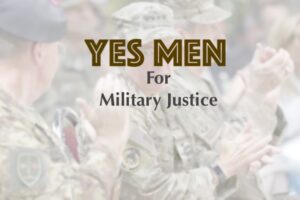
We’re talking today about guns
So doesn’t matter what service you’re in, service members love firearms. And the problem is that currently in America, there’s probably more firearms laws and regulations with different variations out there than any other topic. It is something that is highly regulated and unfortunately it’s not uniformly regulated. So you could go from having a very different legal reality through the course of your military career when you go to different places. So what I’d like to talk about today is what are your duties to comply? How does it apply to you, and what do you need to do to stay out of trouble? And what do you do if you find yourself in trouble?
And this firearms and military personnel is a topic really that’s going to require several videos, and we’ll try and make some more. But here’s the bottom line that you need to know as a military service member. You may have heard about or been told some barracks lawyer telling you that, don’t worry. There’s different rules that apply to service members and they might even show up. You might Google search and find a statute that says something about doesn’t apply to military personnel and the conduct of their duties. That does not mean that you do not have an obligation to comply with local laws for your state. So let’s say you are from Tennessee, a state which is very supportive of individual gun ownership liberties, and you may be used to having certain types of firearms. You may be free from normal types of purchasing, background check requirements or different types of regulatory requirements about carry and storage and usage, and then types and parts of ammunition and magazines and all that stuff.
And you think, well, I am a legal resident of Tennessee and I’m moving to California for an assignment, but I’m good to go because I heard the law doesn’t apply to military personnel and the conduct of their duties. That is not what that means. Okay? So every citizen is free to move throughout the United States. One of the great things about our republic, you have the freedom to go from state to state and, and exercise your rights and your freedom, but those states that you’re in at the time get to regulate you. And the fact that you have an ID card that says, I’m a legal resident of your home state and whatever that may be, doesn’t stop the laws of the current state applying to you. Nor does it help when you pull out your active duty military ID card and say, but wait, I’m an active duty service member.
Does not mean that you get to pass the laws of those state. The important thing to remember is this, you are always a US citizen and you always have to abide by the laws. And the fact you are a military service member does not require or remove the requirements of the state to apply to you. Now, let’s talk about what those statutes mean. If you have heard of or seen some statute that talks about how this doesn’t apply to military service members in the conduct of their duty. Take the great state of Washington here. Washington state historically, actually was a pretty conservative state when it come to firearms laws that has changed in recent years and it, and has currently added a lot of new laws recently. And some of those laws restrict things like magazine capacity like Washington and Oregon recently have passed those laws. And they’ll have language in there that says, does not apply to military service, moves in the performance of their duty. That means that military personnel in the state of Washington with their assigned weapons doing their job are not committing crimes because they’re possessing a 10 round magazine or they’re possessing an automatic weapon just like it’s illegal in a lot of states have walked around with a rocket, right? Or walk around with high explosives. But when you’re traveling to a range and you’re part of the ammo detail, or you are going to do some sort of training event, you’ve got explosives or pyrotechnics or whatever, there’s actually provisions in the state law that says it’s okay for the individual service members, even though they’re legally in the state and they are individual subject to the law because laws have to account for that problem, right?
We all know the federal government is the top dog when it comes to that. We understand that generally the constitution flows down. It is the law of the land. There’s federal supremacy and all that stuff. But at the end of the day, when people go to write a state law, they have to account for these different variations. And one of those is that they don’t want to criminalize and cause hassle for service members who are executing their duties. In other words, military issue, equipment and weapons. Okay? That language does not say that just because you happen to be a military member or an active duty service member of some kind, that the other parts of that law don’t apply to you. So when you find yourself in a state, or if you’re getting ready to PCS to a state, take a little time, do a little research.
There are plenty of groups, including groups who are interested in gun rights and people are interested in gun control. Both sides have lots of information out on the internet about each states and their laws. Do your due diligence, make sure you know what your limitations are before you PCS so that you’re in compliance when you get there. And rules will vary by installation as well. So as part of your in brief, you should receive information about what you can and can’t do on that installation. My advice to you is if you find yourself in trouble where you’re worried that you may have crossed the line or you’re facing some sort of adverse action, now is the time to seek extra, a little bit of extra help in the form of professional legal advice. And I would advise you don’t go down to your generic law firm, go to somebody who understands the military, military regulations and policies, and the UCMJ, somebody that is a specialist in military law. That’s what we do here at the Law Office of Jocelyn Stewart, and we’re happy to take your call. So good luck to you. Thank you for your service and if you find yourself in trouble, we’re the ones you should be talking to.
Contact the Law Office of Jocelyn C. Stewart at 253-212-958
You Might Also Like These Articles

Today, we're covering a lot of topics that deal with general officer memoranda of reprimand, because we certainly field a…
Read More
Years ago, when the rating scheme for judge advocates changed from being rated within the Office of the Staff Judge…
Read More
So, after a very long and arduous battle. My client is free. He had been suffering under false allegations of…
Read More



 REQUEST A CONSULTATION
REQUEST A CONSULTATION 